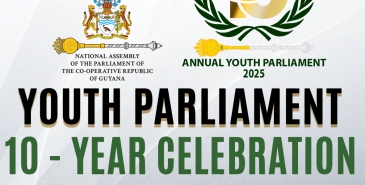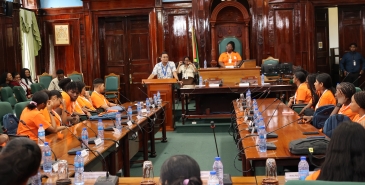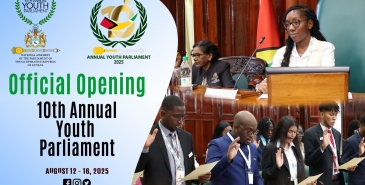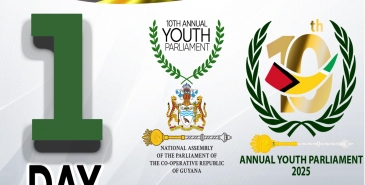Limit On Amount Outstanding Under Guarantees Given Under The Guarantee Of Loans (Public Corporations And Companies) Act
Speech delivered at: 60thSitting - Tenth Parliament - 18 July, 2013
18 July, 2013
7313
LIMIT ON AMOUNT OUTSTANDING UNDER GUARANTEES GIVEN UNDER THE GUARANTEE OF LOANS (PUBLIC CORPORATIONS AND COMPANIES) ACT
Attorney general and Minister of Legal Affairs [Mr. Nandlall]: Thank you very much, Sir. A lot has been said on this motion already and it is now my turn to add my contribution.
The motion which is before the House seeks to expand a limit on the guarantee that the Government of Guyana can give under the laws of Guyana. The particular statute to which the motion relates is the Guarantee of Loans (Public Corporations and Companies) Act, Cap 77: 01. This legislation was passed in 1971. Clearly, the intention was to curb the aggregate sum of money that any government can seek to guarantee which aggregate money would come from the consolidated fund. The rationale for such a restriction being placed upon a government is so axiomatic that it requires no expansion. The Act by its long title reads:
“An Act to provide for the Guarantee by the Government of Guyana of loans to public Corporations and Companies in which the Government has a controlling interest and to authorise the Government to give undertakings to sources of financing under which sums payable by the Government pursuant thereto shall become chargeable to the Consolidated Fund.”
The corporation is defined in the legislation as the Guyana State Corporation, any public corporation or body corporate over which the Guyana State Corporation exercises supervision and control pursuant to Section 5 of the Public Corporations Act, any corporative society registered under the Co-operative Societies Act and any company incorporated in Guyana in which the Government or the Guyana State Corporation holds at least 51% of the ordinary share capital hereof. Lending agency means an international financial organisation or any bank, insurance company or other source of financing.
In 1971 when this Act was passed, the limit then was $25 million. In 1974, on the 9th February, it was increased by 100% to $50 million. Then in 1976, on the 18th March, it was again increased from $50 million to $200 million. Then on the 20th March, 1978, another resolution was moved, increasing it from $200 million to $500 million. And then on the 21st April, 1980, we increased it in this House from $500 million to $1 billion. All these increases were done under the People’s National Congress Government.
In 2013, the PPP Civic Administration, for the first time, is seeking to raise that ceiling from $1 billion to $150 billion. Dr. Ashni Singh, in his most erudite presentation, did the mathematical computation and calculated the inflationary rate to establish beyond any disputation that were we to increase the limit following the inflationary rate extent, then we ought to have come for an extension to the tune of some US$1.1 billion. Here, we are simply asking for three-quarter of US$1 million or US$750,000. It is the first time that we are doing it and we are not doing it capriciously or arbitrarily; we are doing it to meet a requirement which is at hand. What is that requirement?
Guyana, often times, is described as a country of immeasurable potential. Often times it is said that if Guyana’s potential is unleashed, then, in the fastest possible time, we can catapult ourselves way beyond where we are. Many reasons have been advanced and can be advanced for why we have not moved as swiftly as we should up the developmental ladder. But no one can dispute that among the problems which have hindered Guyana’s progress economically up that ladder is our inability to provide our people, our manufacturing sector and our country with a cheap, affordable, reliable and sustainable source of electricity. Many leaders have recognised that. Minister Robert Persaud, in his presentation, spoke about this recognition since in the mid 50’s. Dr. Ashni Singh and Minister Irfaan Ali spoke about movements being made for the first time, in a serious way, in this country by a government coincidentally, ironically or paradoxically, a People’s National Congress Government, to bring this into fruition and a reality.
The decision then was not an easy one. Minister Irfaan Ali quoted extensively from the speeches of Forbes Burnham. Hard choices had to have been made and Prime Minister Forbes Burnham at a May Day rally at the National Park put the question frontally to the workers - $14 increase or hydropower. The workers then said that they wanted hydropower. What Minister Irfaan Ali did not say is that what Prime Minister Forbes Burnham said was that if we do not get hydropower, we will get - quote and unquote and with your permission - hydroseeds.
Now it is a very famous remark, widely quoted in the press. We are again faced with this pivotal and fundamental question and from the antecedents which have transpired in the National Assembly, with the rejection of the Bill which preceded this motion and from all indications, we seem to be at that unfortunate precipice where we are again choosing hydroseed instead of hydropower. We did not get to this stage very easily. The path here has been long and arduous; many sacrifices have been made and many persons have worked very hard to bring us to where we are.
Never before in the history of Guyana are we so close having worked for decades to reach where we are; never before, have we been so close to realise this key that can open the door to prosperity for the Guyanese people.
Therefore, it is unfortunate that I am part of a process, personally speaking, because I consider myself a patriot and a person endowed with profound nationalistic sentiments. I want to say, like I am sure all of my Colleagues, it is a deep and profound moment of regret for me to be part of a process that is killing one of the most recognised method of taking our people out of a cycle of oppression, depression and economic stagnation. Our people will judge us. Future generations will reflect upon what we are doing here and will judge us.
Dr. Singh expansively dealt with why we are rejecting it. Sir, if - and let me predicate what I am going to say - by accepting or rather by recognising that every Member on that side, I have no doubt, would like to see a prosperous Guyana. That is why it is so difficult to comprehend how we will explain to future generations why the project died in July of 2013. Why? Because a Member of the Opposition wants to arrest from a Government Minister the Constitutionally reposed responsibility of laying that Minister’s Bill before this National Assembly. That is ultimately the reason why we are here where we are. Not because I have heard a compelling argument that this project is not feasible; not because I have heard that we have not reached the stage for hydro; not that hydro is not required, but rather needed, for the development of this country. I have heard none of those arguments. I have heard utterances which seem to suggest that more time is required.
As Dr. Singh said - he recited a series of events which commenced since March, 2012 of engagements between the Opposition and the Government, attended by experts, financiers and a whole host of people, where the Government sought to bring the Opposition fully on board, to appraise them fully of the intricacies of this project and to clarify and make less ambiguous, any matter which they felt was not clear - the argument which was concocted ex post facto that more time is required is one that is not serious. It is incredulous in fact. Even recently, I was pleased to see my Colleague, Mr. Joseph Harmon and Dr. Rupert Roopnarine, visiting Amaila Falls; visiting the roads. The roads cannot be unconnected with the project, so to draw the distinction is simply elusory.
The Guyanese people felt overwhelmed when they saw that because they interpreted that, and quite reasonably so, as an expression of support from the Opposition.
The Georgetown Chamber of Commerce called upon us just a few hours ago; the Private Sector Commission called upon us a few hours ago because they recognised, as every other Guyanese, the potentials and the benefits that redound to this country and to the ordinary average consumer and of course, the ordinary Guyanese person, the benefits that will flow from the Amaila Falls.
How we will justify if this project, which is now moribund on its way to death, to the taxpayers of this country the moneys we have expended already? We have already spent millions and millions of US dollars on this project – building the roads, expenditures which were approved by the Opposition in this National Assembly, knowing full well that these expenditures were going to be spent on a road that would lead to the Amaila Falls Project. How are we going to explain, rather than build hospitals, buy vaccines for our children, buy more books for our children, we took that money and we built a road going to a project that we slaughtered in this National Assembly? How are we going to explain that to future generations? Why did we do it? [Interruption] Do you want to know about Mr. Flip Motilall ask the person next to you? The Public Relations (PR) Officer is there. How are we going to justify that?
These are questions that we can quibble about now; we can laugh at now, but these are serious questions. It is not our money; it is the people of this country money. We are simply the custodian. When they elected us to this house, Dr. Singh spoke ... [Interruption] Yes, we are going to account for it. We have every penny we are going to account for and we will identify where the wastages took place and why this project failed and who were the architects of its failure; we are going to do that.
Let me reflect a little on the potential, the optimisms that the results of 2011 Elections brought because reference is being made to it regularly. When those elections results came, they came in some quarters with great hope and expectations, optimism was expressed. Many felt that we were now coming to a period where we would demonstrate political maturity that those in the House would use the majority vote they have to wrest from the Government that which is in the best interest of the Guyanese people. So pregnant were those results with those possibilities and potentialities.
I have, time and time again, reflected on what has transpired since. All we have seen since is National issues being sacrificed at the altar of politicians pursuing agendas that, when one examines them, only result to some obscure benefit, some political value and absolutely disconnected with the welfare of Guyanese people, which we are supposed to serve.
Motions about National Commercial and Investment Limited (NICIL); motions about the Marriot Hotel; motions about Fiscal Management and Accountability, not a motion that will touch a single resident in the interior or Essequibo, in Region No. 10 or Berbice, none of them. Instead we had a motion to gag Minister Rohee from speaking. How will that change the quality and nature of the life of the Guyanese people? Only those who prosecuted that motion can say.
That is the type of energy; that is the type of activities in which we have engaged and exhausted valuable political time and money. Your Honour yourself disclosed... [Interruption]
The point I am making is our interest, and focus is so radically and fundamentally posed and light years apart from each other that I speak of hydro-project and my friend speaks about toilet bowls - a toilet bowl. I speak of a project that would transform the life of every single Guyanese and he speaks of a toilet bowl. If your mind... [Interruption] I thank the Member for that; I thank you Mr. Ramjattan because that disclosure puts into prospective where the Government stands – where the People’s Progressive Party/Civic Administration stands - and where the Opposition stands. They stand with the toilets; we stand with hydro-projects. We stand with hydro-projects; you stand with the cesspits and the toilets.
I say all of that to demonstrate how important this project is. [Interruption]
The arrangements which have been ironed out to bring this project into fruition includes a compendium and amalgam of several things, including a power purchase agreement to be executed between the Hydro-Power Company and the Guyana Power and Light Company., whereby the Guyana Power and Light Company would be contractually enjoined to purchase exclusively all the power generated by the hydro-project, as a condition precedent to the financing being granted by the financial institution or financial institutions, which is a normal requirement in commercial activities of this type. They have required a guarantee to be given by the State of Guyana. Indeed, that is the singular purpose of the Act. [Member: We have to bankroll.] The Friend is saying that we have to bankroll, what he does not appreciate and I speak to you Sir, but since they have chosen not to speak, I still have to answer their concerns. The whole purpose of this Bill, the whole purpose of this law – the guarantee of loans, Public Corporations and Companies Act – is to do exactly this because this is a standard requirement in transactions of this type.
As I said the People’s National Congress (PNC) had to do it in 1971 and I have no doubt that if one checks the statute books of countries in the Caribbean a similar legislation would be found. Financial institutions, the World Bank, International Monetary Fund (IMF), the China Development Bank and the Inter-American Development Bank would not single out this measure and apply it to Guyana as a singular territory. Obviously, this is part of a menu of measures which they implement in instances of this type. This Bill or this motion simply seeks to extend the limit which we have to allow for a guarantee to be executed by the Government of Guyana in favour of Guyana Power Light (GPL) to guarantee this, as a condition precedent to us receiving moneys from the Inter-American Development Bank (IDB).
One political party has said that they will only support this project if the IDB supports the project. Maybe that statement was made wittingly or simply made out of ignorance of the facts of this matter. The amendments which are before the House and this motion are conditions precedent to the IDB giving the green light to the projects. I am repeating - these requirements are conditions precedent to the IDB funding this project. In fact, we have to get this motion passed and the Bill passed before a deadline for these matters to be considered by the IDB Board, which is scheduled to sit sometime in October. [Interruption] Well we spoke to them; I do not know who you spoke to. I believe some of their representatives are in the House. So I do not know who you spoke to because the Government have been told that these are conditions precedent to the project being financed and we have to. It is not where we have to get the IDB’s agreement first; it cannot happen. That is putting the cart before the horse. We were told that we have to get this done. That is why we are here.
Therefore, I ask the Opposition at this late hour – the records must reflect my exhortation, my plea and my appeal to the Opposition for their support of this motion.
The last point I want to make is this. There are matters which we can play politics with, we are all politicians; we know that. Let me say that the People’s Progressive Party/Civic Administration is committed to holding Local Government Elections in the shortest possible time. Let me put that on the records so that it would not be said tomorrow that we are delaying Local Government Elections. We are ready to debate those Bills at any time, but we will not allow the Bill to be kidnapped from the Executive. It is the Executive’s Bill. Do you want to hijack and kidnap and pirate the Bill from the Minister, which part of the world has that ever happened?
Therefore, I do not want it to be peddled tomorrow in the press that this Government is attempting to delay the Local Government Elections. We are prepared to meet tomorrow to deal with that. If the Amaila Falls is rejected it must be rejected without any basis and the Guyanese people will judge you. Thank you very much. [Applause]
Speech delivered by:
What's New

17 August, 2025
10th Annual Youth Parliament Closes: Celebrating a Decade of Impact, Excellence, and Youth Empowerment10th Annual Youth Parliament Closes: Celebrating a Decade of Impact, Excellence, and Youth Empower

13 August, 2025
Youth Parliamentarians Assemble for Grand Rehearsals for the 10th Annual Youth Parliament

12 August, 2025
10th Annual Youth Parliament Kicks Off – Young Voices, Bold Ideas, Bright Futures!

11 August, 2025
10th Annual Parliament Kicks off tomorrow

